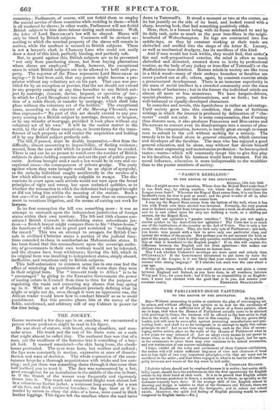" PASSIVE REBELLION."
TO THE EDITOR OF THE SPECTATOR.
Ballytore, 12th July 1843.
Slit-1 might answer the question, Where does the Repeal Rent come from ?' in our Irish way, by asking another, viz. where does the Anti-Corn-law League come from ? Wherever the Repeal Rent comes from, it is not from the landlord's rent, for that is paid as usual; and the great wonder of all is, after- three such bad harvests, where that comes from.
I may say the Repeal Rent comes from the bottom of the well, where it has lain with Truth ever since alcohol was invented. Formerly, the very poorest- man in Ireland expended from twopence to sixpence a week on alcoholic poison, and he is now called upon for only one farthing a week, or a shilling per annum, for the Repeal Rent.
You call our agitation a " passive rebellion." Why do you not apply a. similar epithet to the Anti-Corn-law agitation ? The Corn-law is as much one of the institutions of the country as the Act of Union. One is only a few years older than the other. They are both only acts of Parliament ; and both, you know, were passed with a view to serve only one particular class, and against the wishes of the people. But perhaps you do not account the Irish as part of the people, and think that the only question worth considering is, whether this or that is beneficial to the English people ? if so, this will explain the difference between the English and the inch agitations : this makes our O'CorniELL a traitor and your COBDEN an honest man. May I ask whether COBDEN'S meetings are more quiet and orderly thtuL O'CorovELL's ? If the Government threatened to put down by force the meetings of the League, is it not likely that your orators would meet such menace with strong language ? If I mistake not, such was the case about a year ago. If not quite impossible, I wish you could steer as even and plain a course. between England and Ireland, as you have done, in all weathers, between. Whig and Tory, for years back : but if this be an impossibility to an English- man, I must rest content with the good that is in you, and remain your


























 Previous page
Previous page